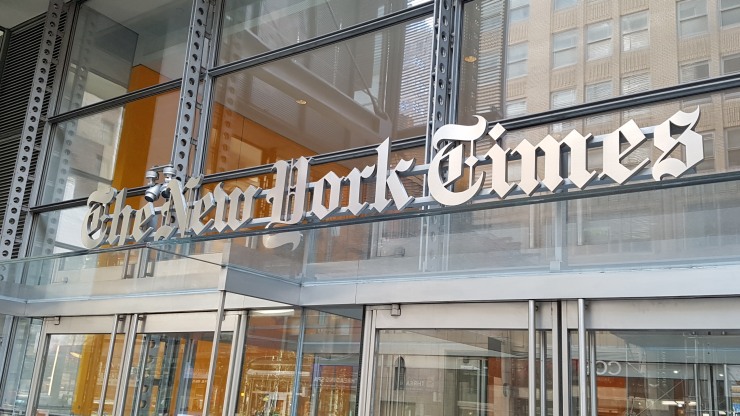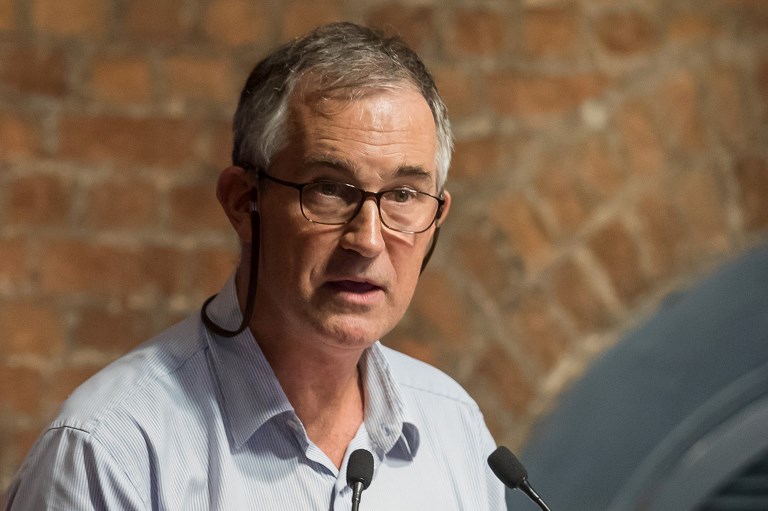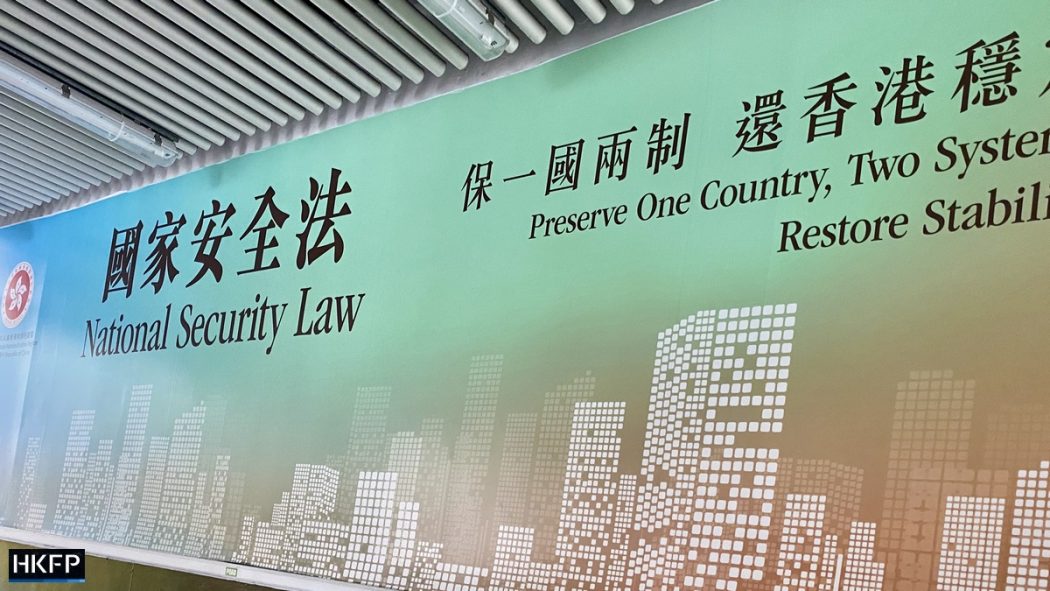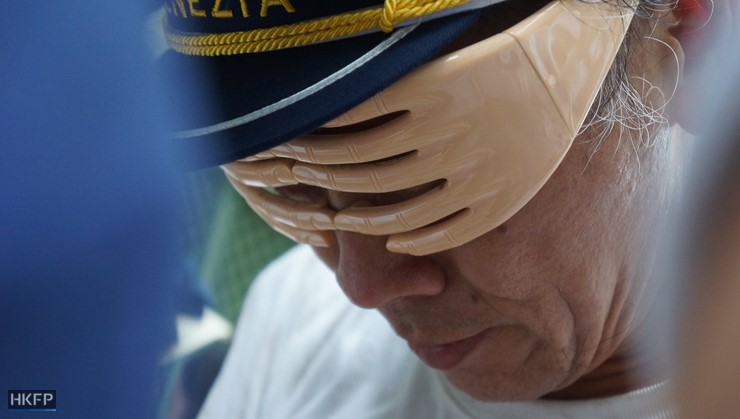
Doreen Weisenhaus is working on a new edition of the Hong Kong Media Law textbook – a title that is likely on every local newsroom’s bookshelf. But Weisenhaus has told HKFP that she has had to make some serious edits following the new security law: “When I wrote my first and second edition of Hong Kong Media Law,… I concluded that… no major new law had been enacted in Hong Kong that would threaten press freedom in a strong way.”
“I also mentioned that no news organisations had been shut down or censored for political reasons. [And] that if any of these things happened, we would have the courts to rely on. I don’t think I can say that anymore.”
The professor said that the effects of the new law were not only impossible to ignore, but mark a fundamental change in how journalists can continue working in the city. “I do think this is indeed a watershed event, we will look at this in the future… as an important time where things definitely changed, and not for the better.”
Room for optimism?
When asked what she saw as the role of the courts under the security law, Weisenhaus referred to the lingering optimism of her fellow academics in Hong Kong. “My colleagues at HKU, Albert Chen and Simon Young, both have some optimism that at least we can try the initial cases in court, that there is some judicial review of police action,” she said.

Given that the law is still in its early stages of implementation, the lecturer at Northwestern’s Pritzker School of Law said that she didn’t have all the answers: “For example, one aspect of the law is that police can ask news media to remove content from websites and if people don’t, they may face penalties. People say you can go to court and challenge that; is this something we can do?” she asked.
However, echoing the sentiment of an op-ed by Professor Simon Young for SCMP, she insisted to HKFP that journalists in the city shouldn’t throw in the towel without a fight: “We can’t roll over, we have to continue to try to hold up the rule of law, the normal procedures, and hope that there might be some kind of give and take so we can hold on to the freedoms we currently still have.”
‘Weaponisation of visas’
In spite of the hope that Beijing may be bound by the interpretations of Hong Kong courts, international organisations have already started to shift their staff to nearby cities. Earlier this week, the New York Times office in Hong Kong announced that a third of their staff will be relocating to Seoul, citing concerns about press freedom under the security law and difficulty obtaining work visas for staff.

“I think [other news firms] are thinking about it, and they are currently contemplating what their exit plans might be. They still need to keep a presence in Hong Kong to cover what’s actually happening.”
She also said that denying work visas to create obstacles for news organisations is a move from China’s playbook. “Unfortunately one of [the Times’] reporters based in Hong Kong did not get his work permit renewed. I think that’s a big issue in terms of the weaponization of visas, something we know is part of what happens in mainland China.”
She added that there is an increasing fear the same tactics to censor journalists on the mainland will be transferred to Hong Kong “If they don’t like what your content is, if they don’t like what you’re reporting about, then your visa is not renewed… So that’s the fear: that this will be used in Hong Kong.”

Weisenhaus said that evidence of Beijing’s encroachment upon Hong Kong’s press freedom already existed in 2018 before the passing of the security law. That year, Financial Times journalist Victor Mallet was denied a visa renewal following his hosting of a panel at the Foreign Correspondents’ Club that included a speaker with pro-independence views.
Safe haven no more
Weisenhaus – who taught media law and ethics at the University of Hong Kong for 17 years – said that the curtailing of the city’s freedoms under the new law is the saddest thing about the current situation. “Hong Kong used to be known as this oasis of free speech in Asia when I first came in the year 2000. We knew that we could use Hong Kong as a safe space for people coming from different parts of the world… who didn’t feel comfortable in their own countries. Hong Kong might no longer be that safe haven anymore.”
In these dramatically different circumstances, Weisenhaus had a message for the city’s journalists: “I think overall, journalists will continue to report vigorously…and cover this very important story – Hong Kong. But I do think you have to be careful about who you speak to, you have to be careful about protecting your sources, because any prosecution might not just go after you, but also who you talk to,” she warned.

She said that the law will not make this easy as violators face large fines and prison time unless they cooperate. Nonetheless, she added that it was important for journalists to delineate clear guidelines for themselves to navigate the new law: “I’m not saying destroy everything, but you have to establish a policy of security for who you’re talking to – how you’re going to protect not just yourself but your sources in the future.”
‘Elastic terms’
Looking to the specifics of the law and its effects on the media, Weisenhaus highlighted major differences from national security laws in other jurisdictions, “I think the biggest difference is how some of it is just not tied to specific acts, or imminent or clear and present danger. It doesn’t seem to have those standards attached to it,” she said. “Some of it is just not defined in traditional ways.”
“Anyone who follows laws in mainland China sees this over and over again. They’re written in deliberately vague ways [so] they become elastic terms to apply to whatever the given situation.”

Another possible blurring of the lines between China and Hong Kong under the new law is online censorship. When asked whether China’s “Great Firewall” will descend around Hong Kong, Weisenhaus is wary: “Definitely, the law allows avenues to do this. Article 43 can demand that certain content be removed…So what you might see is more internet and tech companies removing their servers and operations out of Hong Kong,” she told HKFP.
“Will it turn into the Great Firewall? We certainly hope not, but there are some tools that will allow that to start to happen.”
Given the threat of arbitrary enforcement of the security law on the press in Hong Kong, Weisenhaus insisted on leaving a message of hope: “I believe that Hong Kong journalists are some of the bravest in the world… and I think you will continue to report in as vigorous of a way as possible, because it’s really an important story that needs to be gotten out, not just to Hongkongers, but to the rest of the world as well.”

